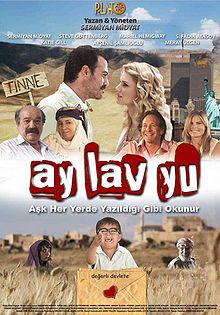Ay Lav Yu
| Ay Lav Yu | |
|---|---|

Theatrical poster
|
|
| Directed by | Sermiyan Midyat |
| Produced by |
Sinan Çetin Gülşah Ünder Ebru Yalçın |
| Written by | Sermiyan Midyat |
| Starring | Sermiyan Midyat Steve Guttenberg Mariel Hemingway |
| Cinematography | Ercan Özkan |
|
Production
company |
Plato Film Production
|
|
Release date
|
|
|
Running time
|
102 minutes |
| Country | Turkey |
| Language | Turkish |
| Box office | $1,128,315 |
Ay Lav Yu is a 2010 Turkish comedy film, written and directed by Sermiyan Midyat, about a young man who having completed his education returns to his home village along with his American bride-to-be. The film, which went on nationwide general release across Turkey on 12 March 2010, laid claim to various firsts for Turkish cinema including; first movie to feature Turkish, Kurdish, Syriac and English dialogue; first movie to show the blend of different religions in East Turkey; and first comedy with an international ensemble to look at the 9/11 attacks.
Filming took place from 14 July to 10 August 2009 on location in Hasankeyf, Nurlu, Izbirak and Istanbul, Turkey.
Yusuf Ağa, the landlord of the tiny southeast Anatolian village of Tinne, keeps sending petitions to high level state officials to make the voice of his village heard by the central government. Years ago, Yusuf abandoned his son, İbrahim, in the courtyard of a university so that he could get a good education and become an important man. There, İbrahim was found by Father Hana, who raised him and gave him a good life. Now İbrahim has turned 30, and he returns to his village along with his girlfriend, Jessica. But will the tiny village of Tinne become the new home of İbrahim and Jessica? SYNOPSIS In a forgotten part of the Earth, in a deserted land in this forgotten part, is a simple and lonely village ‘Tinne’. Almost no one knows about its existence, except the beaming Sun maybe.
This land is Tinne, that doesn’t even exist on the national map, that has no school, roadway or clinic. No dweller has identification paper over there. ‘Existence’ or ‘nonexistence’ is the one and only question. Its destiny may as well be the victim of its name’s definition in Kurdish language, which means ‘non-existent’.
Tinne, a village abandoned to its own destiny in the middle of Mesopotamia, in the Southeast of Turkey, has been intentionally or unintentionally ‘forgotten’ by the government for years. Its inhabitants don’t even have any record in the civil registry. Neither Tinne, nor any of its people exist officially, whereas Yusuf Agha and its whole family have been living in this land for over a century.
Even though Yusuf Agha constantly tries to get in touch with the government, he cannot get a reply to any of his letters. Hoping that his son will get a certificate of identification, he decides to leave his newborn son Ibrahim in the courtyard of the college while many others leave theirs in the mosque’s courtyard. Luckily, Priest Hanna who happens to pass by there comes to Ibrahim’s rescue. He adopts him so that he has identification, so that he exists, and by his existence, makes Tinne finally exist.
...
Wikipedia
